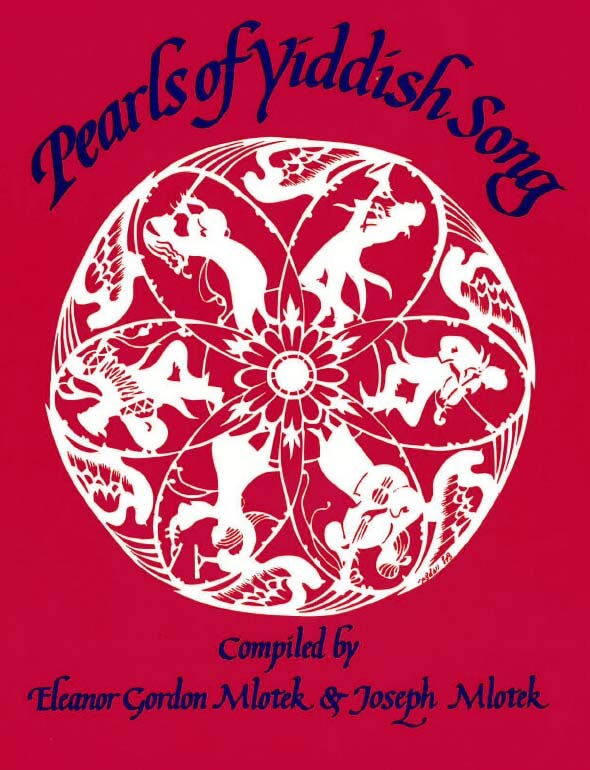Folksong published by M. Kipnis in 1918. In Populerste folks-lider, Kipnis states that this song originated in Vilna and referred to Yoshke, a member of the underworld, who was harassing Jewish tradesmen in the market place. When the Russo-Japanese war broke out in 1904 and Yoahke was ordered to the front, the elated Jews of Vilna made up a song about his parting with his bride. Compilers collected an additional stanza from Sonia Smolnlk Tencer (Montreal) in Hollywood, Fla. January, 1988; She heard it in Vilna in the 1930’s: “Oybn iz a brikele. / Un untn flist a taykhl, / Yoshke fort avek / Un lozt ir iber mit a baykhl.” (There’s a little bridge above and a stream flows below. Yoshke is going away and leaving her with a belly).

Don’t buy me lockets,
and don’t make me pretty;
Buy yourself a pair of boots.
To the army you must go.
Oy, oy, oy,
Yoshke is going away;
in one more hour and then another
the train leaves!
Farewell,
my dear bride,
I will miss you,
more than anyone.
Oy, oy, oy,
Yoshke is going away;
one more kiss and one more pet,
(and then) the train leaves!
The train has arrived,
and fear takes hold of me!
Let us say good-bye,
the train is leaving!
Don’t wail and don’t cry,
it’s all rubbish!
In Ivan’s army, I will be
the handsomest in the ranks.
Koyf mir nit keyn lokenes
Un makh mikh nisht sheyn;
Koyf dir a por shtivelekh,
Tsum priziv darfstu geyn.
Refrain:
Oy,oy, oy, oy,
Yoshke fort avek;
Nokh a sho un nokh a sho,
Der poyezd geyt avek!
Zay zhe mir gezunt,
Mayn tayere kale,
Nokh dir vel ikh benken,
Mer vi nokh ale.
Oy, oy, oy, oy,
Yoshke fort avek,
Nokh a kush un nokh a glet,
Der poyezd geyt avek!
Di ban iz shoyn gekumen,
Un es khapt mikh on a shrek!
Lomir zikh gezegenen,
Der poyezd geyt avek.
Klog zhe nisht un veyn zhe nisht,
S’iz altsding blote;
Ikh vel zayn bay fonyen
Der shenster in der rote.
קױף מיר ניט קײן לאָקענעס
און מאַך מיך נישט שײן;
קױף דיר אַ פּאָר שטיװעלעך,
צום פּריזיװ דאַרפֿסטו גײן.
רעפֿרײן:
אױ, אױ, אױ, אױ,
יאָשקע פֿאָרט אַװעק;
נאָך אַ שעה און נאָך אַ שעה,
דער פּאָיעזד גײט אַװעק!
זײַ זשע מיר געזונט,
מײַן טײַערע כּלה,
נאָך דיר װעל איך בענקען,
מער װי נאָך אַלע.
רעפֿרײן:
אױ, אױ, אױ, אױ,
יאָשקע פֿאָרט אַװעק;
נאָך אַ קוש און נאָך אַ גלעט,
דער פּאָיעזד גײט אַװעק!
די באַן איז שױן געקומען,
און עס כאַפּט מיך אָן אַ שרעק!
לאָמיר זיך געזעגענען,
דער פּאָיעזד גײט אַװעק.
קלאָג זשע נישט און װײן זשע נישט,
ס’איז אַלצדינג בלאָטע;
איך װעל זײַן בײַ פֿאָניען
דער שענסטער אין דער ראָטע.
Song Title: Yoshke Fort Avek

First published in 1988 as Pearls of Yiddish Song: Favorite Folk, Art and Theatre Songs, this anthology contains 115 songs. Some material had never been published, while others, included in rare song collections or sheet music, were largely inaccessible. The songs presented reflect Jewish life in Eastern Europe and the United States and depict childhood, love, family celebrations, poverty, work and struggle. There are also songs from the Hasidic and Maskilic movements, songs of Zion and of America, as well as songs from the Yiddish theater.
The title of this anthology derives from the weekly two-page feature column “Pearls of Yiddish Poetry,” which the compilers Yosl and Chana Mlotek initiated in 1970 in the Yiddish newspaper Der Forvertz (the Yiddish Daily Forward). Hundreds of readers from around the world — including authors, composers, singers, actors — became co-participants in this collective folk project and recalled melodies, lines, fragments, stanzas and their variants of songs, poems, and plays which they had heard in their youth. At first, readers sent in only written material. Later, they also taped songs on cassettes, many of whose melodies had, until then, never been recorded. They also identified and supplied missing information regarding lyricists, poets, and composers and described the circumstances surrounding the songs’ origins, their dissemination, diffusion and impact.